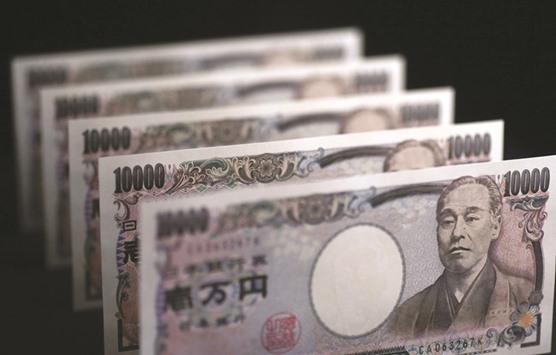The bull run that’s made the yen this year’s best-performing Group-of-10 currency is far from over.
That’s the view of Bank of Tokyo-Mitsubishi UFJ, a unit of Japan’s biggest bank. And when its strategists say the yen will advance another 7% by the end of December, it’s worth listening – they were last year’s most accurate forecasters of Japan’s currency among the nation’s lenders.
By their estimates, the yen’s on course to end the year at a 2 1/2-year high of 100 per dollar. It already gained 12% in 2016, defying the majority of analysts, on concern that global growth is flagging.
Now, risks are multiplying, including faltering economic data, a UK vote on its European Union membership and US presidential polls. It’s a cocktail of woe that only enhances the haven appeal of a currency that’s been buoyed by Japan’s 22 straight months of current-account surpluses.
“We need to be sufficiently on guard,” said Minori Uchida, the head of global markets research at Bank of Tokyo-Mitsubishi UFJ. “A loss of momentum in the US would more or less mean the same for global growth and make people feel wary about risks.”
The yen is rebounding in 2016 after four consecutive years of decline, unwinding much of the impact of the Bank of Japan’s record monetary easing, and raising the prospect of a gain to 100 per dollar for the first time since 2013. Options traders put the odds of it reaching 100 by the end of this year at about 48%, up from just 6% at the end of 2015.
Most foreign-exchange analysts are still catching up with the speed of the rebound. They changed their median year-end forecast to 114 yen from 125 as of the end of December. The currency was at 106.75 in New York yesterday.
The yen’s rapid climb this year has become major concern for Japan’s government as Prime Minister Shinzo Abe struggles to revive the economy amid a slump in overseas demand for the nation’s exports. At meeting in Japan last month, finance chiefs from the world’s biggest developed countries underscored concern that global growth is flagging and reaffirmed a pledge not to deliberately weaken their currencies.
Amid signs of weakness in economic data, expectations the Federal Reserve will raise interest rate in the coming months have waned.
That’s accelerating the yen’s advance, according to Jun Kato, a senior fund manager in Tokyo at Shinkin Asset Management, which managed ¥758bn ($7.1bn) as of March 2015.
“The view that US rates won’t rise for now dealt a huge blow to currency markets,” said Kato, who forecasts the yen will advance past 105. “We have a protectionist, inward looking trend that’s spreading globally, which may pose as a risk and become the driver for yen strength.”
Next up - the UK referendum on June 23 which is too close to call is based on opinion polls and threatens to splinter the European Union. Market fluctuations may then widen heading into the US presidential election, according to Mitsuo Imaizumi, the Tokyo-based chief foreign-exchange strategist Daiwa Securities Co.
“From around late September, markets will likely swing on a daily basis just as they have been with the Brexit issue,” he said. “Markets will keep investors sleepless because of fears about what opinion polls will show.”
Yoichiro Yamaguchi, the head of research at Sumitomo Mitsui Banking Corp, said that while the yen could still fall toward 115 by year-end if the US economy remains on a gradual recovery path, Japan’s currency is vulnerable to gain when risk events occur.
“For US and European investors, Japan is literally in the Far East, far away physically from where risk events are,” he said. “Investors seek safety over profitability when they shun risk. Japan has the stablest political and economic conditions among Asian nations and is a creditor nation. It’s inevitable the yen appreciates on risk-off.”

The yen is rebounding in 2016 after four consecutive years of decline, unwinding much of the impact of the Bank of Japan’s record monetary easing, and raising the prospect of a gain to 100 per dollar for the first time since 2013.
